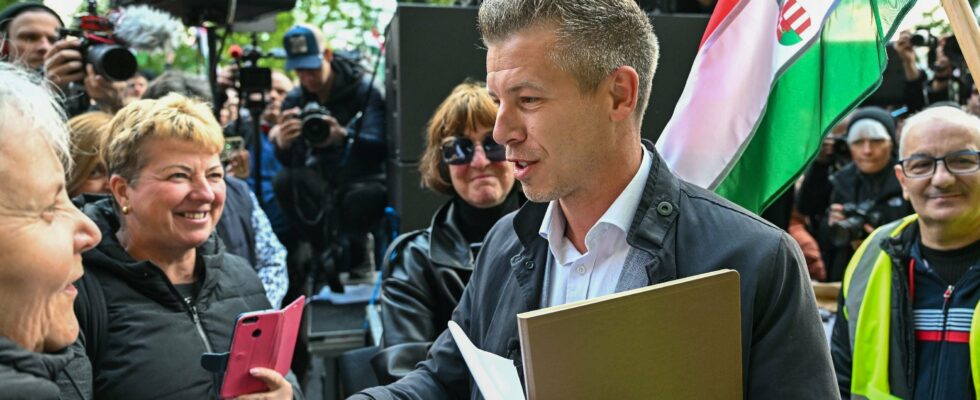This is an incredible breakthrough in Hungary that has been locked down for fourteen years by Viktor Orbán. On February 10, a major scandal in a child abuse case caused the resignation of President Katalin Novák and the withdrawal from public life of Judit Varga, former Minister of Justice who was to lead the Fidesz list in the European elections. The next day, a former diplomat named Péter Magyar, Varga’s ex-husband and a pure product of Fidesz, appeared in the alternative media Partizán to attack the government.
Son of renowned jurists, the dissident turned against the system that fed him from Budapest to the corridors of European institutions. Three months after his coup, the renegade with the golden-boy look has become the number one anti-Orbán, crushing a poor left-liberal opposition. On March 15 and April 6, tens of thousands of people listened to him in Budapest. On April 17, he announced the European list of his Tisza (Respect and Freedom) party and began a national tour.
“Many see in him an opportunity that they did not see in anyone in the opposition. And not only opposition voters, but also this middle class which is now expressing its fed up with the destruction of democracy” , observes political scientist Stefano Bottoni. “The emergence of Tisza is an unknown situation. But from the point of view of Fidesz, it is an advantage that the opposition is disrupted,” adds political scientist Ágoston Mráz of the Nézőpont institute, close to the government.
“Brick by brick”
On the platform of a van, on a stage or in the middle of a village square, Magyar promises in each of his multiple speeches to “take back the country step by step” and “brick by brick”. A one-man show like Beppe Grillo (the former leader of the Italian 5 Star Movement) mixed with Emmanuel Macron 2017. His credo? A “free” and “European” Hungary going against the Orbán model. But in addition to her diatribes and her fans ready to send her center-right party to Brussels, where she wishes to join the European People’s Party (EPP), Magyar takes care of her symbols.
In Göd, in front of the Samsung SDI factory, he denounces the profusion of electric battery workshops in Hungary, especially Chinese, and their environmental dangers. In Felcsút, Viktor Orbán’s childhood village, he takes the local train to better criticize this whim financed by the EU. In Keszthely, on the northern shore of Lake Balaton, he points out during a bicycle tour the luxury hotels of those close to the regime, including Orbán’s son-in-law. In Röszke, near the anti-migrant fence on the Serbian border, he criticizes the Orbán government’s use of foreign workers and the release of migrant smugglers by the executive.
On May 5, he chose Debrecen, the country’s second city and Fidesz stronghold, for his largest meeting in the province. Hundreds of supporters joined him by train from Budapest. “He is young, he has momentum. We hope that he will restore the rule of law. If we unite, the autocracy of Fidesz can be overthrown,” said Rozália, a hairdresser, who move. “I have never seen such a sharp politician in decades. He has accomplished much more alone than the entire opposition,” greets her husband Sándor, a restaurateur.
Catch-all project
A moderate conservative, pro-European and pro-market economy, Péter Magyar recalls Viktor Orbán of 1998, propelled as Prime Minister at the age of 35 by the clearing of the heirs of communism. His ideological corpus brings him closer to Péter Márki-Zay, the united opposition candidate defeated by Orbán in the April 2022 elections. But the man gives rise to all kinds of projections. Its detractors from the left compare it to Fidesz without Orbán. The Prime Minister’s camp presents him as a traitor, a “servant of Brussels”, a henchman of the “dollar left” financed by George Soros and a persecutor who allegedly terrorized his ex-wife.
With his charisma and exploding popularity, Magyar defends a catch-all project in 21 points. Born into politics, this godson of the former Hungarian president Ferenc Mádl, who participated in demonstrations as a child and followed parliamentary sessions on TV, wishes in particular to double family allowances, increase the value of smaller pensions and limit the number of mandates of deputies and the Prime Minister to a maximum of two. The anti-Orbán also advocates Hungary’s membership in the European Anti-Corruption Prosecutor’s Office, a program to bring back Hungarians living abroad, the independence of public media and increased support for SMEs.
HAS a few days before the European elections on June 9, polls place him ahead of the center-left coalition and the rest of the opposition including the Momentum liberals, from whom he risks stealing their two seats. But the ambitious sees further. “We will win the legislative elections of 2026 and will not need a coalition,” Magyar even gets carried away in an interview with the weekly HVG. It remains to be seen whether Orbán will let him do so.
